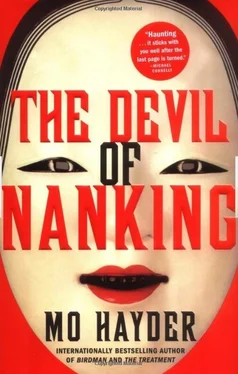I straightened, and stepped a little way out of the trees to get a sense of what else was nearby. I pushed aside a branch, took a pace forward, and my breath caught in my throat. For a moment Shujin was forgotten. We had climbed so high! The sun was coming up behind the mountain, pink and flecked with cinders from distant fires, and further down the slopes, perched among the trees, the intense, glazed blue of Sun Yat-sen’s mausoleum shone against the snow. If I turned to the east, between the mountains I could see glimpses of the thirsty yellow plains of the delta stretching away into misty horizons. Below me the city basin was smouldering like a volcano, a black pall of smoke hung over the Yangtze, and I saw, with a sinking heart, that it was all as I had guessed: the river at Meitan was in chaos – I could see bombed boats and sampans listing in the mud. Old Liu had been right when he said east was the direction to go.
As I stood there, with the sun on my shoulders and all of Jiangsu stretched out beneath me, I had a sudden surge of defiance, a sudden furious determination that China must survive as the China I grew up in. That the silly superstitious Festivals of White Dew and Corn Rain would live on, that ducks would always be driven across fields at dusk, that every summer the lotus leaves would appear, so thick you would believe it possible to walk across the ponds balancing on the slabbed leaves alone. That the Chinese people would continue – that my child’s heart would be for ever Chinese. As I stood on the mountain, in the first rays of dawn, with a rush of pride and fury, I raised my hand to the sky, daring any evil spirit who cared to come and take my son. My son, who would fight like a tiger to preserve his country. My son, who would be stronger than I had ever been.
‘I dare you,’ I whispered to the sky. ‘Yes, I dare you.’
You can never tell what’s going to make the headlines. Most of the evidence surrounding the crime scene in Takadanobaba pointed to one guilty party: Ogawa, the so-called Beast of Saitama. And yet for one reason or another (perhaps you could forgive the nervousness of the journalists involved) this detail was never widely publicized by the newspapers. She was brought in for questioning, but quickly and mysteriously released, and to this day lives free, somewhere in Tokyo, occasionally glimpsed behind the smoked glass of a fast-moving limousine, or entering a building at dead of night. It’s a mistake to underestimate the links between the yakuza and the Japanese police.
Meanwhile the murder of Jason Wainwright, as I later discovered he was called, hit the news and stayed there for months. It was because he had been well educated and was a good-looking Westerner in Japan. Hysteria gripped his mother’s state of Massachusetts. There were accusations of police incompetence, of corruption and mob influence, but nothing that ever led anywhere, least of all to Fuyuki and the Beast of Saitama. Suit-wearing teams of family lawyers jetted in on Thai Air jumbos, but no matter what strings they tried to pull, what money was offered, no one would talk about Jason’s life in the months before the killing. Nor was the mystery female who had called his mother a day before his death ever found.
But probably what caught the public’s imagination more than anything was the horror of the crime scene. It was what the Nurse had used to decorate the stone lantern. It was the image of the Wainwright family man arriving fresh off a plane from California, knocking on the door, still clutching his Samsonite travel bag, an aeroplane toothbrush and a taxi receipt in his pocket, snow falling on to his suit. It was the thought of what he saw when he got no answer and decided to walk a few feet down the alley, where two rusty garden gates stood open.
I had been gone from the house only half an hour. I had crept through the gates, taken my bag from the alley and gone to the public baths on the other side of Waseda Street. As the Wainwrights’ man was making sense of the serpentine coils round the stone lantern, as the blood left his face, as he sank to his knees, fumbling for a handkerchief, I was only a hundred yards away, squatting on the little green rubber stool in front of the knee-high showers, shivering so hard that my knees were knocking. Ten minutes later, when he staggered out on to the street, his hand up to hail a taxi, I was in another taxi on the way to Hongo, perched on the edge of the seat, my hair wet, a cardigan clasped round me.
I stared out of the taxi window, at the piled-up snow, at the strange light it reflected into the faces of the women as they picked their way carefully along the pavements under pastel-coloured umbrellas. I had an overwhelming sense of the loneliness of this city – a trillion souls in their bedrooms, high in the cliffs of windows. I thought of what was underneath it all – I thought of the electricity cables, steam, water, fire, subway trains and lava in the city’s guts, the subterranean rumbling of trains and earthquakes. I thought of the dead souls from the war, concreted over. The tallest, most-visited building in Tokyo, the Sunshine Building, stood over the spot where Japan’s prime minister and all her war criminals had been executed. It seemed to me so odd that no one knew what had just happened to me. No one had come up to me and said, ‘ Where have you been all night? What’s that in your rucksack? Why haven’t you gone to the police? ’ I watched the taxi driver’s eyes in the rear-view mirror, certain that he was studying my face.
I got to Todai just after nine. The blizzard had picked up and the snow was settling on all the parked cars and the tops of lamp-posts. The Akamon, the huge red lacquered gate at the entrance of Todai, was visible only as a wavering red splash in the white, an intermittent blaze in the snowstorm. A guard wearing a black slicker ushered me through the gate and the taxi nosed along the driveway until, out of the white, a light appeared, then more, and at last the Institute of Social Sciences, rising up in front of us, lit and gilded like a fairy castle.
I asked the driver to stop. I tucked in my coat collar and got out, standing for a while, looking up at the building. It was four months since I’d first come here. Four months, and I knew so much more now. I knew everything – I knew the whole world.
Slowly I became aware of a dark figure not far away from me, small as a child, standing perfectly still in the snow, as insubstantial and wavery as a ghost. I peered at it. Shi Chongming. It was as if my thoughts had conjured him, but done the job half-heartedly so instead of the real flesh and blood Shi Chongming I’d created only this watery half-person.
‘Shi Chongming,’ I whispered, and he turned and looked and smiled. He came towards me, slowly materializing from the white, like a ghost evolving. He was wearing a coat and his plastic fisherman’s hat pulled down over his hair.
‘I was waiting for you,’ he said. His skin in the odd light looked papery and insufficient: there were penny-sized liver spots on his face and neck. I saw that his jacket was fastened tightly round his neck.
‘How did you know?’
He held up his hand to hush me. ‘I don’t know. Now, come and get warm. It’s not good to stay out in the snow for a long time.’
I followed him up the steps. Inside, the institute was warm, overheated, and we trailed melting snowflakes across the floor. He closed the office door, put on his glasses and began to make the room comfortable. He plugged in a heater, and made me a bowl of steaming tea. ‘Your eyes,’ he said, as I put down the holdall and knelt on the floor, instinctively adopting the seiza position, as if it would warm me to be so contained, cupping the hot tea in both hands. ‘Are you unwell?’
Читать дальше












